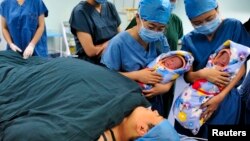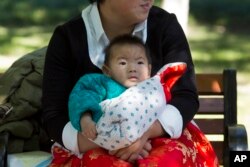This year saw China loosen its one-child policy, which for decades had prevented millions of families from expanding. The fertility industry abroad is responding to the possibility of scores of Chinese interested in having more children.
At the end of October, China’s government made the landmark decision to ease the country’s one child policy for the first time since it was implemented 35 years ago. All married couples in China are now allowed to have two children, and many in the fertility industry are predicting that China will become the world’s top market for in-vitro fertilization technologies.
“I can imagine that people who have actually conceived one child when they’re in their mid-30s many years ago might now be in their mid-40s. And even though they would prefer to have a child on their own they find that that is no longer possible,” said Luk Rombauts, a professor and doctor with Australia’s Monash IVF Group Limited.
Couples face bureaucratic hurdles when trying to conceive through IVF clinics in China. The Chinese government forbids gender selection and advanced fertility procedures.
Families also have to apply for birth licenses and provide proof of marriage before being treated. So increasingly China’s growing middle class is going abroad for fertility treatments to places like Australia, Thailand and the United States.
James Marshall manages business development at Superior A.R.T., a fertility clinic in Thailand. He said the number of Chinese patients has nearly doubled over the last three years.
“As a percentage of our total patients it has risen from being about, maybe three years ago, maybe being about 15 percent to now being about 35 percent of our total patients,” said Marshall.
Clinics like Superior A.R.T. are changing their services to draw Chinese customers.
Marshall said Superior A.R.T. has hired Mandarin-speaking staff, begun publishing clinic brochures in Mandarin and sought affiliation with other hospitals and fertility clinics in China.
In doing so, overseas hospitals may be filling a gap left by an over-strapped health care system in the Chinese mainland, where just a few hundred clinics performed half a million IVF treatment cycles in 2013. That is compared to 200,000 IVF cycles performed in the United States during the same year.
Sue Channon, Group CEO of Virtus Health, headquartered in Sydney, Australia, said her company has seen increased interest from Chinese.
“There has certainly been an increase in inquiries from Chinese consumers, and also medical providers looking to partner with our Australian medical clinic. We have a very strong reputation in Australia for delivering very high quality and safe fertility services. Many of our doctors and staff in Australia speak Mandarin,” said Channon.
The horrors of China’s one child policy, such as forced abortions and sterilizations, may be soon replaced by a boom in the fertility industry, with foreign companies standing to benefit from the increased demand.








